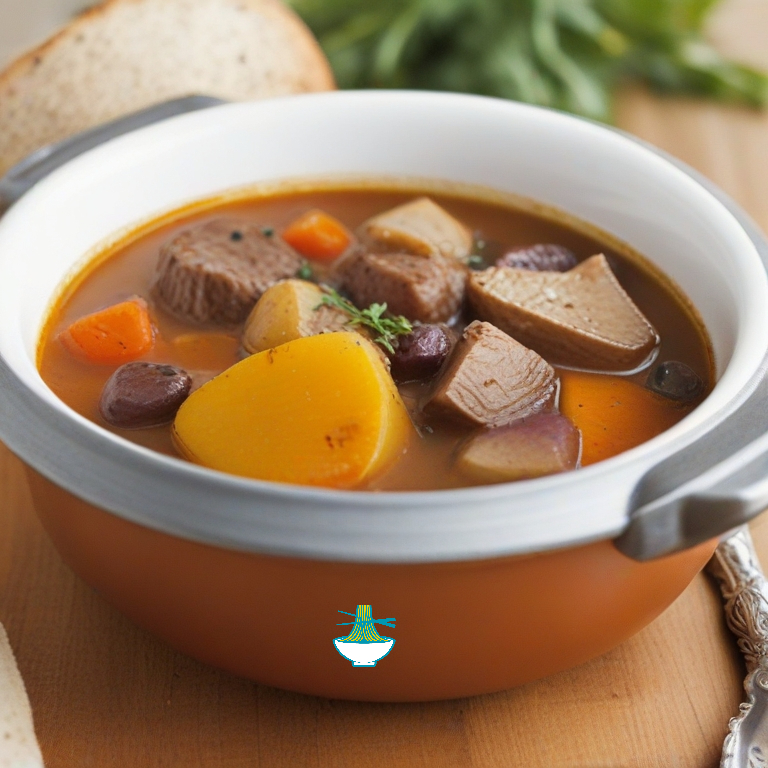Dive into the heart of Greenlandic cuisine with our tantalizing Greenland Seal Stew. Crafted from the finest Arctic seal meat, this hearty dish is a testament to the culinary traditions of the northernmost regions. Slow-cooked to perfection with a medley of root vegetables, aromatic herbs, and indigenous spices, each spoonful offers a symphony of flavors that warm the soul and invigorate the senses. Experience the rich cultural heritage of Greenland through this wholesome stew, where every bite tells a story of resilience, sustainability, and the timeless bond between the people and their land.
Here's a recipe for Greenland Seal Stew:
Ingredients:
- 1 lb (450g) seal meat, cubed
- 2 tablespoons vegetable oil
- 1 onion, chopped
- 2 cloves garlic, minced
- 2 carrots, peeled and diced
- 2 potatoes, peeled and diced
- 1 parsnip, peeled and diced
- 1 turnip, peeled and diced
- 4 cups (1 liter) beef or vegetable broth
- 1 bay leaf
- 1 teaspoon dried thyme
- Salt and pepper to taste
- Chopped fresh parsley for garnish (optional)

Instructions:
1- Heat the vegetable oil in a large pot over medium heat. Add the cubed seal meat and brown it on all sides, about 5-7 minutes. Remove the meat from the pot and set it aside.
2- In the same pot, add the chopped onion and minced garlic. Cook until the onion is soft and translucent, about 5 minutes.
3- Return the browned seal meat to the pot. Add the diced carrots, potatoes, parsnip, and turnip.
4- Pour in the beef or vegetable broth, ensuring that the vegetables and meat are covered. Add the bay leaf and dried thyme. Season with salt and pepper to taste.
5- Bring the stew to a boil, then reduce the heat to low. Cover the pot and simmer for 1 to 1 1/2 hours, or until the seal meat is tender and the vegetables are cooked through.
6- Once the stew is ready, remove the bay leaf. Taste and adjust the seasoning if necessary.
7- Ladle the Greenland Seal Stew into bowls and garnish with chopped fresh parsley if desired. Serve hot and enjoy the hearty flavors of the Arctic!
Note: Feel free to customize this recipe by adding other root vegetables such as celery root or rutabaga, and adjust the seasoning according to your taste preferences. Additionally, you can serve the stew with a side of crusty bread or traditional Greenlandic flatbread for a complete meal.
Nutritional Values:
Providing precise nutritional values for seal meat can be challenging as it can vary depending on the species, cut, and preparation method. Additionally, seal meat is not commonly found in standard nutritional databases. However, I can offer approximate values for the other ingredients commonly used in the recipe:
Onion (1 medium onion, chopped):
- Calories: 44
- Carbohydrates: 10 g
- Fiber: 2 g
- Protein: 1 g
- Fat: 0 g
benefits:Onions are rich in antioxidants and sulfur compounds, which may help reduce inflammation, improve heart health, and boost immune function.
Garlic (2 cloves):
- Calories: 9
- Carbohydrates: 2 g
- Fiber: 0 g
- Protein: 0 g
- Fat: 0 g
benefits:Garlic is known for its potent medicinal properties, including its ability to boost the immune system, reduce blood pressure, and improve cholesterol levels.
Carrots (2 medium carrots, diced):
- Calories: 50
- Carbohydrates: 12 g
- Fiber: 3 g
- Protein: 1 g
- Fat: 0 g
benefits:Carrots are packed with beta-carotene, a precursor to vitamin A, which is essential for good vision, immune function, and skin health. They also provide fiber, which supports digestive health.
Potatoes (2 medium potatoes, diced):
- Calories: 220
- Carbohydrates: 51 g
- Fiber: 6 g
- Protein: 5 g
- Fat: 0 g
benefits:Potatoes are a good source of carbohydrates, which provide energy for the body. They also contain vitamin C, potassium, and B vitamins, which support overall health and metabolism.
Parsnip (1 medium parsnip, diced):
- Calories: 100
- Carbohydrates: 24 g
- Fiber: 6 g
- Protein: 2 g
- Fat: 0 g
benefits:Parsnips are rich in fiber, vitamins, and minerals, including vitamin C, folate, and potassium. They promote digestive health, support immune function, and may help regulate blood pressure.
Turnip (1 medium turnip, diced):
- Calories: 34
- Carbohydrates: 8 g
- Fiber: 2 g
- Protein: 1 g
- Fat: 0 g
benefits:Turnips are low in calories and high in fiber, vitamins, and minerals. They provide antioxidants, such as vitamin C and beta-carotene, which help protect cells from damage and support overall health.
Please note that these values are approximate and can vary based on factors such as size, variety, and cooking method. Additionally, the nutritional values do not include the seal meat as precise values are not readily available.


Comments